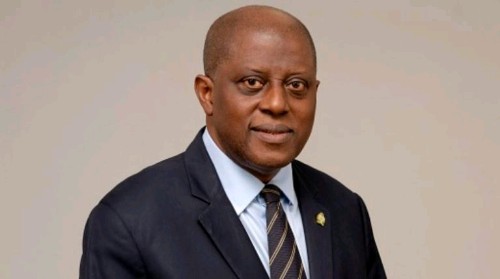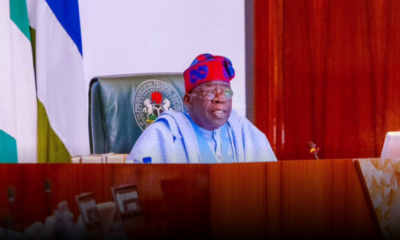Olayemi Cardoso, governor of the Central Bank of Nigeria, has said that the apex bank will no longer give Ways and Means to the Federal Government until the previous loans are repaid.
Olayemi noted that it was one of the measures taken by the apex bank to curtail the economic country currently plaguing the country.
Ways and means is the money that the CBN lends to the Federal Government in the meantime to augment spending based on the time the revenue is generated.
Cardoso on Friday alongside the economic team met with the Senate Committees on Finance, Appropriations, Banking, Insurance, and Other Financial Institutions.
The Senate had summoned the economic team including the CBN governor, Minister of Finance, Wale Edun; the Minister of Budget and Economic Planning, Atiku Bagudu, the Minister of Agriculture, Abubakar Kyari to address the current economic situation and more importantly, the free fall of the Naira and hike in prices of food.
The CBN governor said, “On our side at the CBN, we have responded with significant monetary policy tightening to reign in inflationary pressure.
“Empirical analysis has established that money supply is one of the factors fueling the current inflationary pressure. For instance, an analysis of the trend of the money supply spanning over nine months shows that M3 increased from N52.01tn in January 2023 to N68.25tn in November 2023 representing N16.24tn or 31.22 percent increase over the period.
“Increase in Net Foreign Asset following the harmonisation of exchange rates and the N3.22tn ways and means advances were the major factors driving the increase in the money supply.”
He further explained, “I am pleased to note the Fiscal Authorities efforts in discontinuing Ways and Means advances. This is also in compliance with Section (38) of the CBN Act (2007), the Bank is no longer at liberty to grant further Ways and Means advances to the Federal Government until the outstanding balance as of December 31, 2023, is fully settled.
“The bank must strictly adhere to the law limiting advances under ways and means to five percent of the previous year’s revenue.
“We have also halted quasi-fiscal measures of over N10tn by the Central Bank of Nigeria under the guise of development finance interventions which hitherto contributed to flooding excess Naira and raising prices to the levels of Inflation we are grappling with today.”
He reiterated, “The CBN’s adoption of the inflation-targeting framework involves clear communication and collaboration with fiscal authorities to achieve price stability, potentially leading to lowered policy rates, stimulating investment, and creating job opportunities.”
Cardoso further stated that its efforts were beginning to yield results to ease the economic situation in the country.
He said, “Our MPC meeting on the 26th and 27th of February is also expected to review the situation and take further decisions on these important issues.
“Distinguished Senators, Inflationary pressures are expected to decline in 2024 due to the CBN’s inflation-targeting policy, aiming to rein in inflation to 21.4 percent in the medium term, aided by improved agricultural productivity and easing global supply chain pressures.”
Cardoso while addressing the issues said, “Distinguished Senators, these measures, aimed at ensuring a more market-oriented mechanism for exchange rate determination, will boost foreign exchange inflows, stabilize the exchange rate, and minimize its pass-through to domestic inflation.
“Indeed, they have already started yielding early results with significant interest from Foreign Portfolio Investors that have already begun to supply the much-needed foreign exchange to the economy.
“For example, upwards of $1bn in the last few days came in to subscribe to the Nigeria Treasury Bill auction of N1tn which saw an oversubscription earlier this week.”
Cardoso added, “Our measures aimed at improving USD supply into the Nigerian economy, have significant potential in taming the volatility of the exchange rates. However, for these measures to be sustainable, we must as a country, moderate our demand for FX.”
Meanwhile, on addressing the issue of the free fall of the Naira in exchange for the US dollar and other hard foreign currencies, the CBN governor has advised Nigerians to reduce their quest for dollars, consumption, and usage of foreign goods .
He emphasized that without moderation of demands on USD, the CBN has no magic wand to hurriedly get Naira stabilized.
He, however, informed members of the committee that a series of measures put in place by the apex bank recently are yielding results with an inflow of about $ 1 billion into the economy.
He said, “The Nigerian foreign exchange market is currently facing increased demand pressures, causing a continuous decline in the value of the naira. Factors contributing to this situation include speculative forex demand, inadequate forex supply increased capital outflows, and excess liquidity.
“To address exchange rate volatility, a comprehensive strategy has been initiated to enhance liquidity in the FX markets. This includes unifying FX market segments, clearing outstanding FX obligations, introducing new operational mechanisms for BDCs and IMTOs, enforcing the Net Open Position limit, Open Market Operations and adjusting the remunerable Standing Deposit Facility cap among others.”
He added, “Our measures aimed at improving USD supply into the Nigerian economy, have significant potential in taming the volatility of the exchange rates. However, for these measures to be sustainable, we must as a country, moderate our demand for FX.
“It is also clear that the task of stabilizing the exchange rate, while an official mandate of the CBN, would necessitate efforts beyond the Bank itself. It will also include actions by corporates and individuals to reduce our frequent demand for the dollar for business and personal needs”.
On the Inflation rate, the apex bank governor assured Nigerians that it will reduce to 21.4% in 2024.
“Distinguished Senators, Inflationary pressures are expected to decline in 2024 due to the CBN’s inflation-targeting policy, aiming to rein in inflation to 21.4 percent in the medium term, aided by improved agricultural productivity and easing global supply chain pressures”, he said.
Aside from the CBN Governor, the economic team like the Ministers of Finance, Wale Edun; Budget and National Planning, Senator Atiku Bagudu, Agriculture and Food Security, Senator Abubakar Kyari, also made presentations based on questions asked by the Senators on the State of Economy.
Senator Sani Musa who chairs the Senate Committee on Finance, in a series of posers fired at the Ministers and CBN Governor, queried the $3.3bn collected as a loan to rescue Naira since expected positive effects are not being felt, months after.
Meanwhile, the Chairman, Senate Committee on Banking, Insurance and Other Financial Institutions, Senator Adetokunbo Abiru (APC, Lagos East) underscored the need for a forensic investigation of past transactions and the issue of compliance of the bank.
He said, “We have serious economic challenges, they are largely macroeconomic challenges.
“We have inflation in several countries including developing countries but in Nigeria, we have inflation at almost 20%. What special measures do we have to address this?
“Do we have the place to assist the government to boost food supply in a view to also kind of reduce the weight of food inflation in the consumer price index? That’s my second question.
“How does CBN plan to support the productive sectors of the economy, the agriculture and manufacturing sectors? Because there are the two critical sectors already experiencing heavy growth rates.
“Today the money supply is estimated at close to about 75 trillion and thereabouts. I don’t know what is impeded in that 75 trillion, we have 30 trillion ways and means that ordinarily should have been impeded, but we have structured this into a 40-year instrument at a subdued interest rate of 9%. These are part of what is creating the distortions in the economy.”
He specifically, urged the CBN governor to make available to the committee, an audited account of the apex bank and its budget.
On his part, Senator Orji Uzor Kalu (APC, Abia North) called for the ban of dollar use in Nigeria, stressing that the government must go back to abolish the use of dollars in business transactions.
“What plans are you putting in place to strengthen the Naira? We must go back to abolish the use of dollars unless to those who are authorized.
“In South Africa, nobody buys anything with dollars. I can see the shops in Abuja putting their goods to be bought in dollars. So what have you done? Where we are now, there is no foreign direct investment that will come to Nigeria, I’m really worried. People are leaving.”
Kalu added, “And what else have you made to bring to book those 2.7 billion dollars that you say that they have been in default of the documents? Who are the Nigerians that have defaulted these documents?
“You must bring them the book and you must make it public because people are attacking us. I can’t go to my constituency. If I go to my constituency, people are hungry, people are shouting at us, and people think we the senators are the cause of the economic problem. We are just making laws. It’s left for you people to execute it.
“So for me, what plans are you making right away to reconcile with NLC and TUC? They have given a 14-day ultimatum. What are we doing to stop that movement? Because I don’t want to see people say this is politics, this is not politics. These people are legitimately doing what they are doing,” he added.

 BIG STORY2 days ago
BIG STORY2 days ago
 BIG STORY4 days ago
BIG STORY4 days ago
 BIG STORY5 days ago
BIG STORY5 days ago
 BIG STORY3 days ago
BIG STORY3 days ago
 BIG STORY4 days ago
BIG STORY4 days ago
 BIG STORY3 days ago
BIG STORY3 days ago
 BIG STORY2 days ago
BIG STORY2 days ago
 BIG STORY24 hours ago
BIG STORY24 hours ago
























